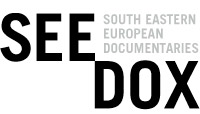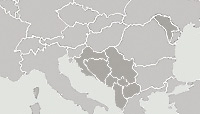By Boris Mitić
Immaculate Conception
If you really want to make your "first international film", you shouldn't be reading this book. [1] Go there, do it, then come back and be smart like the rest of us.
If you are looking for excuses for not making one, this will not be a helpful article either: you will find nothing but encouraging information here.
In documentary filmmaking, as in real life, every little piece of experience you’ve ever gathered is extremely valuable, and what you don’t know is actually more precious than what you already know. This should be your starting point.
[1] published in the guide of the Institute for documentary film.
I myself didn't go to film school...
...and I never even intended to make a film. Now that I made it, I can see that my whole life is in there.
Like all of us, I have been a cinema freak since my childhood days. I was especially lucky to be part of the last generation in my south Serbian hometown to experience the endless ticket lines and packed cinemas for virtually every film. Then came video clubs, then satellite film channels, then I discovered the repertoire of the Cinematheque.
I've always seen myself primarily as a movie spectator. The films that I make now are films that I would like to watch myself. Besides all the (un)written cinema lingo that I unconsciously learned in those early days, I remember very clearly what made me like certain films more than others: the coolness of the anti-heroes, sympathy for the outcasts, humor in desperate situations, a feeling of jubilation upon leaving the cinema… I am now (un)consciously trying to transpose all these things into my own films.
I traveled the world, finished mass media studies, came back, fought a war, then got the best pre-doc job available -- fixing for independent veteran reporters.
Just like a docmaker, a fixer needs to find and set up original stories, always searching for a fresh angle, perfect casting and authentic scenes. Every person you’ve met or are about to meet is a potential collaborator, every piece of information you come across -- a possible screenplay catalyst.
I (re)discovered my country, back and forth, in all its tragic beauty. Within a year, I was offered a full-time fixing job at an international news agency, where I stayed for the next four years. Gradually, I grew disillusioned by the superficiality and complacency of journalism. After covering some particularly nasty events in Kosovo, I had enough of it. I went in, got the exclusive high-risk scoop, threw it on the editor's table and quit.
Stupid decision, everybody thought. So did I, but emotionally and intellectually that was it. Very soon, I understood how appropriate this decision was. There's no greater satisfaction than quitting a well-paid job that you don't like any more...
I am not getting off-topic here...
...to tell you my life story, but to indicate that things must come naturally in the honest business of documentary filmmaking.
A few months before I quit my job, I had spent all my savings on buying my first camera, a new 3-ccd mini-dv prosumer model. I wasn’t thinking much about what I would want to do with it, I probably wouldn’t have bought it if I did. I had never wasted money on any stupid caprice before, this was by far my most irrational purchase ever. I don’t know why I did it. I guess it was nothing but plain childish fantasy that made me want to see how things looked from the other side of the camera.
I still remember how excited I felt. Although I had one foot in plaster, I drove to an obscure dealer to pick up my objet du désir. It was smuggled in, but brand new. Moreover, it was the first piece of equipment that I bought new and factory packed in over 10 years. The camera also felt and looked very cool -- it was love at first frame.
I filmed my apartment for the whole day, then the sunset and the street intersection for the whole night, then I wanted some live emotions in front of my camera.
In my neighborhood, there is a settlement of Gypsy refugees who fled the post-war chaos in Kosovo. I befriended them some time earlier through my bicycle; they charmed me with their inventive transformation of old cars into stylish recycling machines. Their rationale is quite simple: since there is no official recycling service in Belgrade, they decided to sort out the garbage themselves, picking out cardboard, iron and bottles from the containers and selling it to private recycling factories.
In order to beat the cart-pushing competition, they brutally but ingeniously transform old 2cv and Dyana cars (which, ironically, are collectors' items all over the world) into futuristic, Mad Max-type pick-ups. These specific Citroën models are used because they are the only cars from which you can remove the shell without damaging the chassis, thus leaving much room for installing large collecting bins in the back. In the front, the hood is also removed so that the car doesn’t look like an automobile, but rather like an agricultural machine. The cops buy the trick, but not every time...
The “Dyancheros”, as I call them, even use the car batteries as power generators (for light, TV or recharging mobile phones!) but above all, they see these homemade modern horses as symbols of freedom, hope and style.
I took some offbeat souvenir shots of these cool neighbors of mine, but then I experienced, on my home PC, the great magic of editing two shots together. Even then, I didn't mean to make a real film. I basically kept shooting and asking them questions because I was bored of commenting all the raw footage to my friends. I wanted my pictures to be self-explanatory.
I visited the Dyancheros regularly, before and after work. Many people later congratulated me on the quality of the natural light in the film, but this was only a matter of my forced early morning-late afternoon shooting schedule...
I shot over a period of 18 months, but very casually and more than sporadically... Every visit was full of surprises – from the metamorphoses of the Dyanas to the mysterious escapades and reappearances of the main characters; from bailing them out of jail to digitally retouching yellowed family photos; from filming their hybrid pagan wedding rituals to driving them to the dervish in the middle of the night to “cast away the spell” from their sexual problems… In the end, I spent much more time befriending them and doing them all kinds of favors than I did shooting. This is probably why the film was so natural, and I guess, so fresh and so successful.
When I had instinctively compiled...
...a self-sufficient 45-minute story, I made a ‘premiere’ party at my apartment, thinking that this would be its first and last screening ever. I was busy playing the good host, but actually everybody liked the film very much and one of my friends ‘borrowed’ a copy to present it on Sunday's cd market. Within a month, “Pretty Dyana” had become the most popular documentary and the most pirated film in the Balkans. Thousands of copies were made, all kinds of people wanted to show each other this cool new homegrown documentary -- from renowned filmmakers, politicians and folk stars to my football teammates and old army friends... I found all this quite funny. Not only was my accidental movie a total crowd pleaser, but I also felt proud to offer something back to the black market from which I learned all that I know. Besides, with the 'Pretty Dyana' password, I started getting all kinds of new acquaintances and services for free.
People suggested that I should present my film to some festivals, but I knew nothing about festivals then.
I searched on the internet and sent a preview VHS to the next upcoming festival, without knowing that it would change my life. The film got selected… to Amsterdam's IDFA, the biggest and most prestigious of them all! From then on, my Dyanchero story toured the world in 80 festivals, from Argentina to Siberia and from the North Pole to Australia, winning 12 international awards. Ten European televisions broadcasted it to an audience of millions... The reaction was the same everywhere: people were intrigued by the apparently carefree, meal by meal psychology of my Dyanchero neighbors, by barefoot kids playing in the dust and laughing all the time, by gold made from garbage, by illiterates setting a roaring example of sustainable activism, by contagiously proud and happy people. "Cool", "funny", "liberating", people said... just like the great films from my childhood.
The bottom line is as follows:...
the best documentaries are the ones that you don’t see coming, but those can happen only once. For all the others,
do buy your own equipment – hack an online store if needed, but get your own camera;
find loyal collaborators -- you can of course do everything by yourself, but remember that your physical energy and time are much more limited than you motivation. When you manage to find a symbiotic crew, which is actually the most difficult thing in this business, don’t ever let them go away!
don’t worry about budgets -- they are used for money laundering anyways, and good docs CAN be made for very cheap. Enjoy yourself and your relationship with your film;
don’t expect any support -- producers are in this for the money, institutions are corrupted by default and very few people can recognize a good idea in the making;
improvise -- use all the skills and knowledge you ever learned, you will be amazed at how it all fits together;
find an original story -- it has to be exclusive, local and universal at same time, otherwise chances
are that the same movie has been done before. A good bet is to film something that both film professionals abroad and your community members are surprised about;
find great characters -- their wittiness, charisma and energy will be the perfect cover for your moviemaking amateurism. You will fall in love with them and engage in lifelong friendships; spend a lot of time with your heroes, before, during and after the film – this is a crucial ethical and practical strategy that is immediately (in)visible and makes the whole difference. Nobody will ever ask what the budget of your film was or how much time you spent preparing or filming it, as long as the movie’s chemistry works;
film a lot - never be too lazy to go for the extra shots, whatever the filming conditions. You will either get fantastic footage, great sympathy from the protagonists, or both. Think in advance, many times you will have only once chance to record something special;
listen to all advice, but obey only your own instincts -- I was told by many local colleagues that my film was too long, too strangely constructed and too vaguely focused. 50 festivals later, they all changed their mind, but I will bear in mind consider their advices in my future projects;
do your homework -- make a list of festivals and TV buyers, exchange it with colleagues, always try to gather exclusive information that few people know about. Analyze in detail the themes or selection criteria for each of the festivals. I was lucky that “Pretty Dyana” could also play on ethnographic, ecological and urban development theme festivals, on anti-globalist forums, seminars on human rights and minorities, visual anthropology and engineering faculties, youth-motivation and psycho-therapy centers, art house cinemas, intercity buses, mainstream TV channels... There are hundreds of possible outlets for our films. Getting to know them is a tedious but very rewarding task. Don’t sign exclusive distribution contracts; try to do it on your own as much as possible;
win the PR war - You can’t expect the media to do their job, you have to do it instead of them. Draft up a professional communiqué with every important news about your films, most newspapers will pick it up word for word. Offer a little extra piece of information for each media, and they will fall in love with you. My film work is regularly covered both by the serious political media as well as by the yellow press; Get yourself a dot com website, stylish business cards, large posters with Hollywood fonts, several types of non-standard flyers, catchy slogans and subheadings, some memorable promo material… (I made a Pretty Dyana Memory Game!) All you need is Photoshop and a friendly digital printing house;
aromatize all correspondence – use professional packaging and imperatively include little extras. l always put in a postcard from my grandmother's collection with an appropriate little note – if it’s Brazil, about football; for Italy – about women; in the springtime – about cherries... Make all e-mails personal. This is also quite exhausting, but it makes a big difference. When I show up at a festival, hosts and hostesses greet me almost as an old friend. Of course, I play up to expectations. On every visit, I bring slivovitz, chocolates, ethno-art and a USB hard disc from which I dee-jay gypsy music remixes. [This last thing comes in quite handy when festivals are not sure whether they can “afford” to pay for your travel costs…] Have a lot of video cd copies of your films for giveaways. Not many people do that, but that is the goal. Watch films, show your own and get to know people. After each festival, I get invited to 2-3 more.
Nobody taught me all this...
It was all spontaneous improvisation, much like my film.
In a higher league things are different, of course. Co-productions and large budgets may open many doors, but they also tie you up in many unpleasant ways. I am happy to work from this one-man perspective for now.
Around the same time as I did “Pretty Dyana”, I filmed UNMIK TITANIK, another spontaneous, accidental home-movie that made it international. I got sick of ecstatic parties in Belgrade, so I took my camera 400km south to Kosovo to film New Year's Eve celebrations in the surreal UN-protected one-building downtown ghetto in which the last 100 Pristina Serbs live for 5 years without ever daring to go out. I shot that film in one night, without any preparation, something like a last-minute New Year’s Eve decision. It turned out to be my best old-year resolution ever, and a great metaphor of the failure of UN peacekeeping, especially since the building was finally attacked and burnt by Albanian mobs three months later. The film received IDFA’s Jan Vrijman Fund support and was picked up by 20 other festivals. It didn’t have the same commercial success as “Pretty Dyana”, but this could be expected from such a politically incorrect film. The most important thing, besides recording this unique document, is that I managed to exorcise all the frustration of five years of superficial news reporting. I had finally come to terms with my journalistic background. In one night one filming, I managed to tell more than in five years of writing…
Now I am doing a film on Serbian satirical aphorisms. This is how I feel at this moment. The only way out of this meteoric rain of trouble is through authentic, homegrown satire. It’s a very local and very stylish popular phenomenon, something between sophisticated graffiti and subversive existential commentary, and I want to make a film about it. Exorcise this as well. Show that we Serbs, turn-of-the-century outcasts par excellence, can also be cool, funny and liberating, and that man doesn’t need much more than the power of words and the right state of mind to beat his unfriendly environment.
I will work on that film for the next two years. After that I don’t know, everything is possible; I can’t think now of anything more to film. And that's fine with me. I am waiting for a baby boy. After enjoying both sides of the camera, maybe it's time that I become a camera myself for a while. For him. Until a new film idea, immaculately conceived once again, comes our way.



















